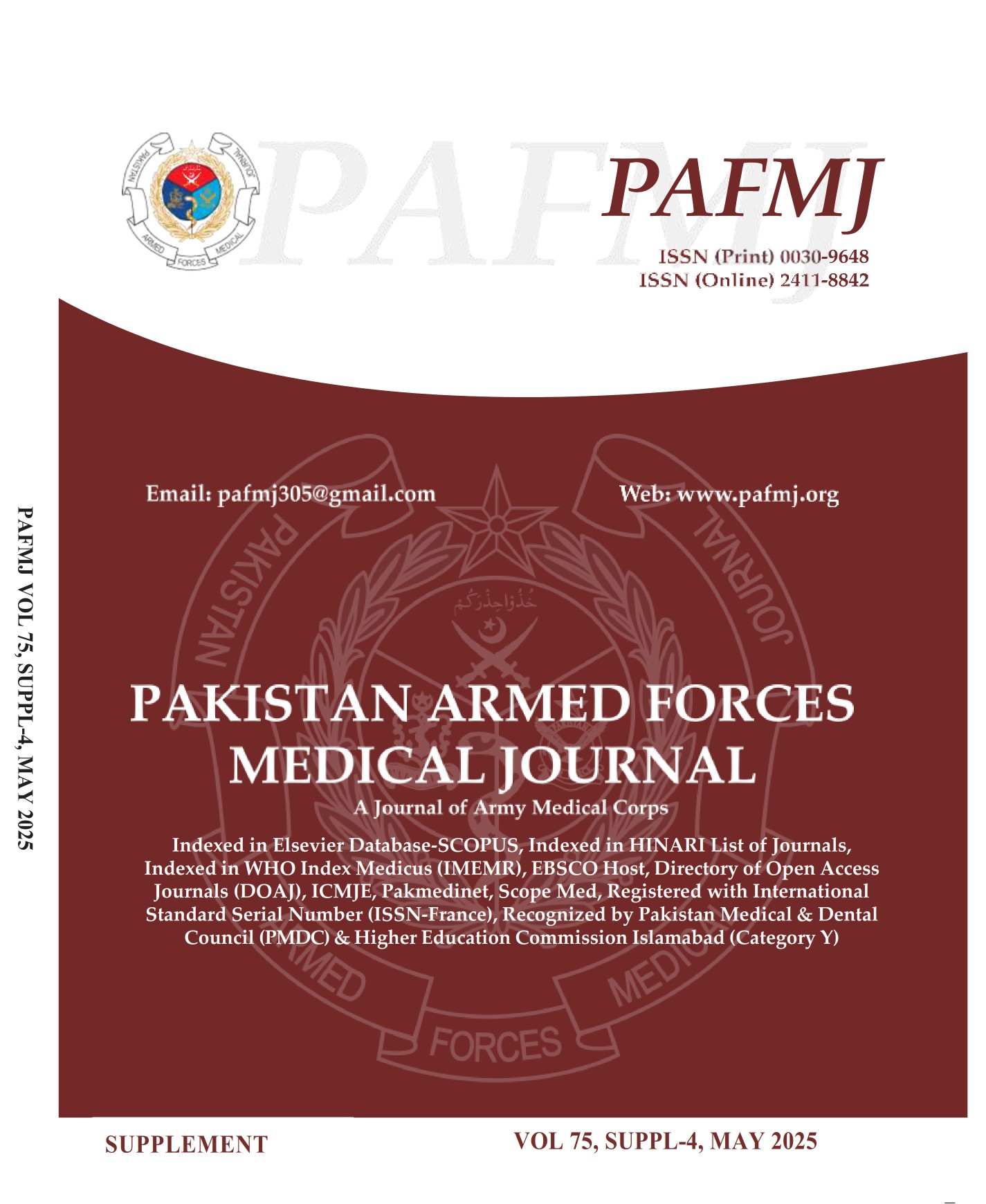Internet Gaming Disorder and its Association with Cognitive Function: A Comparison Between Gamers and Non-Gamers
DOI:
https://doi.org/10.51253/pafmj.v75iSUPPL-4.9500Keywords:
Cognitive Function, Distractibility, False triggers, Internet Gaming Disorder, Memory.Abstract
Objectives: To determine the prevalence of Internet Gaming Disorder and the association between IGD and cognitive functions.
Study Design: Analytical cross-sectional study.
Place and Duration of Study: Different universities of Twin cities from Jun to Sep 2022.
Methodology: A total of 367 participants of 18-26 year-age, belonging to either gender and currently enrolled in a university and excluding someone with priorly diagnosed mental illness were included. Data was collected by questionnaires via Google forms, filled voluntarily after informed consent. Participants filled the Internet Gaming Disorder Scale Short Form to assess gaming addiction and the cognitive failures questionnaire for cognitive function (CFQ). Mean scores were calculated for questionnaires to assess frequency of gamers based on cut-off score of 32 and association of gaming with demographics and cognitive functions was found out by applying Chi-square test.
Results: Out of total 367, 193(52%) males and 174(48%) females participated, with 248 gamers 158(64%) males and 90(36%) females) and 119 non-gamers 25(29%) males and 94(71%) females. Out of these gamers 19(7.6%) individuals -15(79%) males and 4(21%) females- scored as disordered. Association between CFQ and IGD scores was statistically insignificant (p-value =0.062) however the mean scores of different domains of CFQ were relatively higher for disordered as compared to other categories of gamers.
Conclusion: Males were significantly more likely to play games. Overall prevalence of IGD was low. No significant association was found between IGD and cognitive failures of gamers and non-gamers.
Downloads
References
American Psychiatric Association. Diagnostic and statistical manual of mental disorders. DSM-5-TR. American Psychiatric Association Publishing; 2022. Available from:
https://psychiatryonline.org/doi/book/10.1176/appi.books.9780890425787
American Psychiatric Assoc. Internet Gaming, Physician Review. American Psychiatric Association (APA); 2022. Available from:
https://www.psychiatry.org/patients-families/internet-gaming
Przybylski AK, Weinstein N, Murayama K. Internet gaming disorder: Investigating the clinical relevance of a new phenomenon. Am J Psychiatry 2017; 174(3): 230-236.
https://doi.org/10.1176/appi.ajp.2016.16020224
Setyaningsih I, Leksono ABB, Muhrodji P, Edyanto AS, Vidyanti AN. Adolescents with internet gaming disorder are more likely to have lower score of cognitive function: a cross-sectional study among junior high school students in yogyakarta, indonesia. Maced J Med Sc. 2021; 9(B): 1111–1116.
Karasneh R, Al-Azzam S, Alzoubi KH, Nusair MB, Hawamdeh S, Nusir AT. Patterns and Predictors of Internet Gaming Disorder: An Observational Study from Jordan. Clinical Practice and Epidemiology in Mental Health: CP & EMH 2021; 17: 217-224.
https://doi.org/10.2174/1745017902117010217
Fam JY. Prevalence of internet gaming disorder in adolescents: A meta‐analysis across three decades. Scand J Psychol 2018; 59(5): 524-531. https://doi.org/10.1111/sjop.12459.
King DL, Delfabbro PH, Billieux J, Potenza MN. Problematic online gaming and the COVID-19 pandemic. J Behav Addict 2020; 9(2): 184–186. https://doi.org/10.1556/2006.2020.00016
Young KS, Brand M. Merging theoretical models and therapy approaches in the context of Internet gaming disorder: A personal perspective. Front Psychol 2017; 8: 1853-1859.
https://doi.org/10.3389/fpsyg.2017.01853
Zahra S, Kiani S, Shahbaz K. Internet gaming disorder: an emerging addiction among Pakistani university students. NUST Journal of Social Sciences and Humanities 2019; 5(1): 87-104.
Pontes HM, Griffiths M D. Measuring DSM-5 Internet gaming disorder: Development and validation of a short psychometric scale. Comput Human Behav 2015; 45: 137–143.
https://doi.org/10.1016/j.chb.2014.12.006
Qin L, Cheng L, Hu M, Liu Q, Tong J, Hao W, et al. Clarification of the cut-off score for nine-item internet gaming disorder scale–short form (Igds9-sf) in a chinese context. Front Psychol 2020; 11,470.
https://doi.org/10.3389/fpsyt.2020.00470
Rast P, Zimprich D, Van Boxtel M, Jolles J. Factor structure and measurement invariance of the cognitive failures questionnaire across the adult life span. Assessment 2009; 16(2): 145-158.
Zengin H, Çınar N, Erbay E, Topal S, Akduran F. Internet gaming disorder in high-school adolescents and related factors. Ann King Edw Med Univ 2021; 27(4): 523–529.
Jang JH, Chung SJ, Choi A, Lee JY, Kim B, Park M, et al. Association of general cognitive functions with gaming use in young adults: a comparison among excessive gamers, regular gamers and non-gamers. JCM 2021; 10(11): 2293.
https://doi.org/10.3390/jcm10112293
Mihara S, Higuchi S. Cross‐sectional and longitudinal epidemiological studies of Internet gaming disorder: A systematic review of the literature. Psychiatry Clin Neurosci 2017; 71(7): 425-444.
https://doi.org/10.1111/pcn.12532
Hawi NS, Samaha M, Griffiths MD. Internet gaming disorder in Lebanon: relationships with age, sleep habits, and academic achievement. J Behav Addict 2018; 7: 70-78.
Lim JA, Lee JY, Jung HY, Sohn BK, Choi SW, Kim YJ, et.al. Changes of quality of life and cognitive function in individuals with Internet gaming disorder: A 6-month follow-up. Medicine 2016; 95(50): e5695.
https://doi.org/10.1097/MD.0000000000005695
Sung Y, Nam TH, Hwang MH. Attachment style, stressful events, and Internet gaming addiction in Korean university students. Pers Individ Dif 2020; 154: e109724.
https://doi.org/10.1016/j.paid.2019.109724
Hadlington LJ. Cognitive failures in daily life: Exploring the link with Internet addiction and problematic mobile phone use. Comput Human Behav 2015; 51: 75-81.
https://doi.org/10.1016/j.chb.2015.04.036
Park M, Choi JS, Park SM, Lee JY, Jung HY, Sohn BK, et al. Dysfunctional information processing during an auditory event-related potential task in individuals with Internet gaming disorder. Translational psychiatry 2016; 6(1): e721.
Downloads
Published
Issue
Section
License
Copyright (c) 2025 Mommana Ali Rathore, Aliya Hisam, Waqarunnisa Khan, Aida Faisal, Raja Hassnain Abbas

This work is licensed under a Creative Commons Attribution-NonCommercial 4.0 International License.















